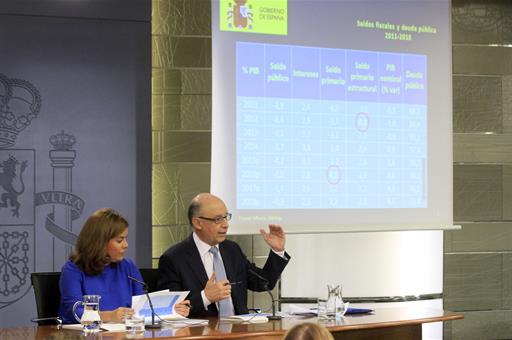Council of Ministers
Government approves initial aid package of 13 million euros to help refugees
Council of Ministers - 2015.9.11
Moncloa Palace, Madrid
The government approved a Royal Decree regulating the direct concession, on an exceptional basis and on humanitarian grounds, of a subsidy to the following NGOs: the Red Cross, the Spanish Commission for Aid to Refugees (Spanish acronym: CEAR), and the Catholic Association Commission for Migration (Spanish acronym: ACCEM), in light of the international humanitarian crisis and the increase in the number of asylum-seekers.
The Vice-President of the Government, Soraya Sáenz de Santamaría, specified that this subsidy is aimed at taking in and integrating applicants and beneficiaries of international protection in Spain. The aim is to increase the number of complementary places under the network for refugee reception centres (Spanish acronym: CAR) and to finance information services, orientation, social intervention, psychological care, legal aid, translation and interpretation services, initial reception in Spain and action at border posts. Moreover, equipment will be funded together with the adaption of properties allocated as reception centres and for social-healthcare attention at Short-Stay Immigration Centres (Spanish acronym: CETI) in Ceuta and Melilla.
Soraya Sáenz de Santamaría remarked that this is an initial subsidy of 13 million euros for 2015 and 2016. The amount of subsidies granted in 2015 exceeds 20.5 million euros, 7.3 million more than in 2014. So far during this term of office, a total figure of 62 million euros has been allocated to this form of subsidy.
This initial aid, explained the Vice-President of the Government, "is tied in, above all, to the increase in applicants for international protection in Spain", and has been expedited following the agreements reached to receive people arriving from Libya and Greece. This aid is in addition to the 200 million euros that the parliamentary groups agreed to on 9 September 2015 following the amendment introduced in the Draft Law on the 2016 General State Budget with the aim of increasing the heading allocated for the reception and care of refugees.
In relation to this issue, the Vice-President of the Government announced that, in addition to taking on the numbers allocated to Spain by the European Commission, the Inter-ministerial Committee set up to this end on 4 September 2015 is analysing the procedures for the distribution and transfer of refugees being determined by Brussels.
The government, she said, is aware that Spain has a very "well established" national asylum system, it is working in collaboration with the regional governments and non-governmental organisations in determining the resources available and on "re-scaling" the transportation protocols so that it will be possible to organise arrivals to ensure "the best reception and integration" of these people.
The Vice-President of the Government thanked Spanish society, the institutions and public administration services for their "tremendous" support shown in voluntarily taking in these refugees.
Public servants and economic stimuli
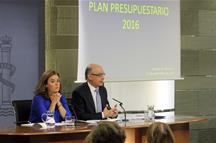 Pool MoncloaThe Council of Ministers approved a Royal Decree-Law specifying measures on public employment, economic stimuli and the granting of extraordinary loans.
Pool MoncloaThe Council of Ministers approved a Royal Decree-Law specifying measures on public employment, economic stimuli and the granting of extraordinary loans.
The Minister for the Treasury and Public Administration Services, Cristóbal Montoro, confirmed that public servants will recover part of their 2012 bonus payment. "The General State Administration will settle this payment at the start of the month of October and will empower the regional authorities to pay this out subject to the availability of funds".
She also recalled that the General State Budget for 2016 contains the full return of this bonus payment which, in principle, will be paid out in two parts according to budgetary availability over the course of the year.
The minister added that authorisations for personal issues will be reinstated, according to length of service and annual leave existing back in 2012. In the case of the General State Administration, public servants may enjoy this leave before 31 January 2016. Cristóbal Montoro reiterated that the government is meeting its commitments to public servants against a backdrop of economic recovery to which they have contributed so much.
The Royal Decree also provides for the granting of extraordinary loans and credit top-ups for an amount in excess of 630 million euros allocated to various ministerial departments. It also provides for initiatives to improve the liquidity of local councils that have financial problems.
In this regard, the minister announced that local councils that meet certain requirements may receive advance payments from the budget earmarked for supplier payments and for settling outstanding debts with the State Tax Agency and the General Social Security Treasury. Some 270 local councils, including some of the main cities in Spain, may benefit from this measure.
On another note, the new legislation amends the Public Sector Contract Act with the aim of reducing late payments in the public sector. Hence, those companies that wish to be awarded a contract with public authorities must be up-to-date with payments to their suppliers. "This has been another of the main aims of this term of office: to tackle late payments, firstly, by the public authorities, and also late payments in Spain in general", he said.
2016 Public Administration Budget Plan
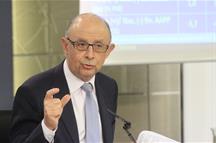 Pool MoncloaCristóbal Montoro referred to the 2016 Public Administration Budget Plan, that shows the consolidated balance of this trend towards budgetary balance, which is "very important in fostering an exit from the crisis and in consolidating the recovery".
Pool MoncloaCristóbal Montoro referred to the 2016 Public Administration Budget Plan, that shows the consolidated balance of this trend towards budgetary balance, which is "very important in fostering an exit from the crisis and in consolidating the recovery".
The text of the report refers to the macro-economic scenario; the consolidated balance of the public administration services; the fiscal balances and public debt; the results and targets of budget stability; the revenue of the public administration services in national accounting terms; the evolution of tax bases and tax revenue; expenditure of the public administration services in national accounting terms and the balance and implementation of public authority spending.
The minister highlighted that Spain still has a very high public deficit but that this is falling due to economic growth. The total weighting of public debt in 2015 on the Gross Domestic Product (GDP) compared with 2014 has only increased by one point according to the government's forecast. Cristóbal Montoro considers that it is fundamental to continue reducing the public deficit to lower this debt but he considers that this should take place against a backdrop of economic growth.
Cristóbal Montoro forecast that the second part of the year will be very similar in terms of economic growth because the government is pushing through a budgetary policy that is virtually the same as in the first part.
The Minister for the Treasury and Public Administration Services also pointed out that the government has approved an agreement establishing the budgetary stability and public debt targets for each one of the autonomous regions under the common regime for the period 2016-2018.
Other agreements
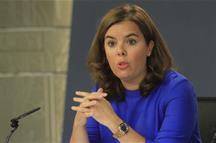 Pool MoncloaThe Council of Ministers authorised the signing of a convention on children' s relations, which seeks to establish a common and global framework that acknowledges the need for children to maintain personal contact with their parents and with other persons with whom they have family ties.
Pool MoncloaThe Council of Ministers authorised the signing of a convention on children' s relations, which seeks to establish a common and global framework that acknowledges the need for children to maintain personal contact with their parents and with other persons with whom they have family ties.
The Vice-President of the Government stated that this convention is very important in situations of separation and divorce when parents live in different countries because this "will facilitate cross-border visits with due guarantees so that children can be returned and to help avoid conflictive situations".
The government also agreed a new regulation of the Autonomous Organisation of European Education Programmes, which will become known as the Spanish Education Internationalisation Service (Spanish acronym: SEPIE). The government also approved the centralised procurement of medication and extended the declaration of drought until September 2016 within the regional scope of the Jucar and Segura river basins.
Current affairs
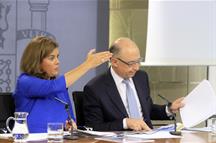 Pool MoncloaWhen asked about the acts to celebrate the National Day of Catalonia and the start of the election campaign for the regional elections on 27 September in Catalonia, Soraya Sáenz de Santamaría recalled that the commemoration of the National Day of Catalonia was, at the start of the democracy, a "celebration for all the people of Catalonia", which later became an event for a minority to make a political claim, but "today has become an election event for Mr Mas", which show a lack of "neutrality" since it uses "what should be for the benefit of everyone for the election interests of but a few".
Pool MoncloaWhen asked about the acts to celebrate the National Day of Catalonia and the start of the election campaign for the regional elections on 27 September in Catalonia, Soraya Sáenz de Santamaría recalled that the commemoration of the National Day of Catalonia was, at the start of the democracy, a "celebration for all the people of Catalonia", which later became an event for a minority to make a political claim, but "today has become an election event for Mr Mas", which show a lack of "neutrality" since it uses "what should be for the benefit of everyone for the election interests of but a few".
When asked for an assessment by the government of the ruling handed down in Venezuela against the dissident Leopoldo López, the government spokesperson expressed the government's "deep concerns" at this ruling and at the political and social instability in the country and called for the elections scheduled on 6 December to be "free, fair, inclusive and transparent" and for "everyone to be able to vote and be elected".





